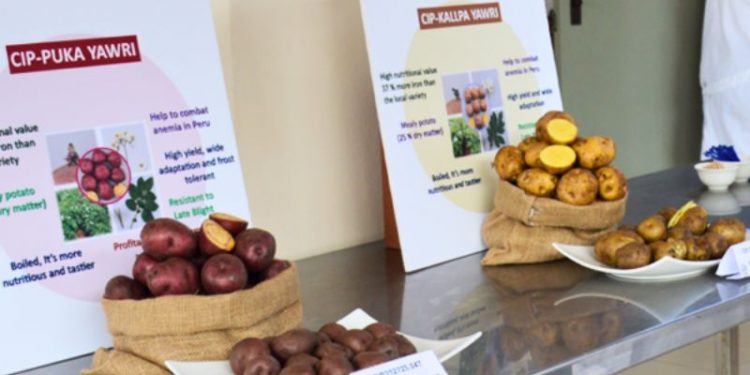CIP Puka Yawri and CIP Kallpa Yawri Offer High Nutritional Value and Resilience
The International Potato Center (CIP) has unveiled two new potato cultivars, CIP Puka Yawri and CIP Kallpa Yawri, marking a significant advancement in agricultural innovation. These cultivars result from a cross between CIP395017.229 and CIP306416.68, leveraging inter-ploid breeding to address evolving farming challenges.
Conducted between September and December 2012 at the Santa Ana Experimental Station of CIP-Huancayo, situated 3,216 meters above sea level, these crosses represent a pivotal milestone in the CIP’s efforts to enhance potato breeding practices. The initiative was supported by two key projects: “Advancing achievements in breeding for early, resilient, and nutritious potato and sweet potato,” backed by USAID, and “Potential new varieties of bio-fortified potatoes with high iron and zinc contents to contribute to food and nutritional security in high Andean farmers,” facilitated by The Technical Secretariat for Coordination of the CGIAR (STC-CGIAR).
The primary objective of the USAID-supported project was to modernize CIP’s potato and sweet potato breeding operations, thus improving value delivery to stakeholders and boosting the adoption of new varieties. Key goals included establishing user-driven breeding markets, identifying areas for improvement, innovating stakeholder engagement methods, and launching capacity-building initiatives.
The STC-CGIAR project aimed to develop bio-fortified potato cultivars with increased iron and zinc contents, supporting food and nutrition security for vulnerable households in Peru’s Andes. Specific goals included selecting and assessing advanced bio-fortified potato clones and implementing capacity development initiatives for relevant stakeholders.
CIP Puka Yawri and CIP Kallpa Yawri exhibit remarkable attributes essential for addressing critical agricultural concerns and enhancing food security. These varieties feature high iron and zinc contents, crucial for combating anemia and malnutrition in the Andean regions of Peru. With wide adaptation (2600-4200 masl), yields exceeding 20 tons per hectare compared to the average 12 tons per hectare of landrace potatoes, and resistance to Late Blight disease, they promise to boost agricultural productivity and resilience.
Furthermore, both varieties demonstrate homogeneity and stability in expressing their distinctive traits. Their superior characteristics, including elevated levels of iron, zinc, and dry matter content, ensure nutritional benefits and exceptional taste and texture, allowing them to compete favorably with traditional varieties in Andean diets.
The dissemination strategy for CIP Puka Yawri and CIP Kallpa Yawri prioritizes women and children in Peru’s northern and central Andean regions. Targeting vulnerable households and emphasizing women’s crucial role in food security aims to reach over 5,000 households initially, promoting the adoption of bio-fortified varieties through educational campaigns and agricultural interventions. This strategy aims to reduce anemia and chronic malnutrition, particularly among Peruvian women and children.
These varieties are available for licensing to certified seed producers registered with the Peruvian Seed Authority (SENASA). CIP has applied for plant variety protection under UPOV and Peruvian legislation and can issue commercial production licenses. CIP requires licensees to provide high-quality seeds to smallholder farmers at preferential rates, ensuring broad dissemination and adoption of the varieties. Additionally, licensees must contribute financially to the Benefit Sharing Fund of the International Plant Treaty, which supports conservation and sustainable use projects in the global South.
This dissemination strategy aligns with Peruvian national priorities regarding the production, availability, and affordability of high-quality seeds for farmers. The plant variety protection rights for the two YAWRI varieties will not infringe on the rights of Peruvian indigenous communities and smallholder potato farmers, who can save and exchange seeds of the varieties among themselves under the UPOV Convention, which Peru is part of. CIP aims to empower and sustain the livelihoods of farmers and indigenous communities through the wide availability of these varieties.







